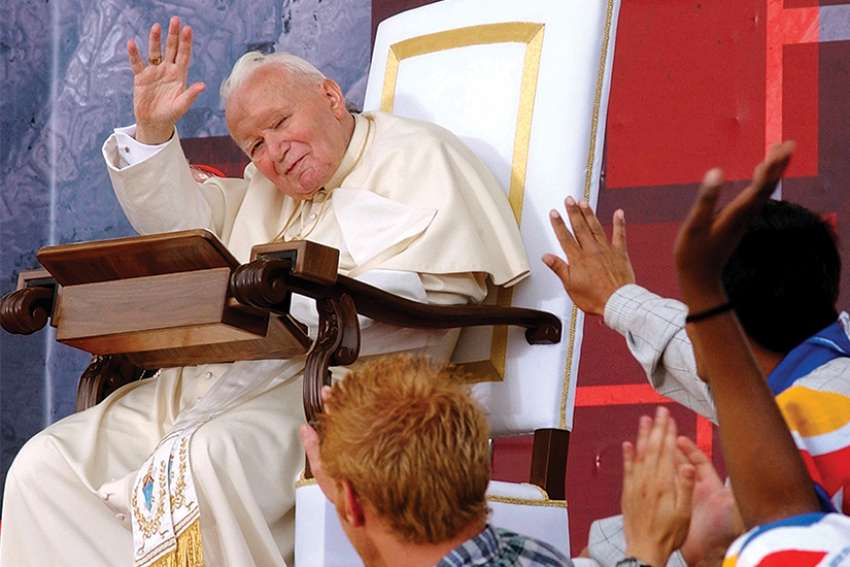Jesus offered the ultimate solution: Give away all your possessions and come follow me. That was more than the man could do; he walked away grieving. So Jesus told the disciples, “For mortals it is impossible, but for God all things are possible” (19:26).
In his encyclical Veritatis Splendor (The Splendour of Truth), issued 25 years ago, Pope John Paul II saw the nub of the story in the man’s realization that leading an exemplary moral life is not enough. To fulfill the law, one’s life and actions must be rooted in an encounter with Christ. Indeed, that encounter must be the centre of one’s entire life.
Veritatis Splendor was Pope John Paul’s most controversial encyclical. It drew sharp rebukes for its critique of moral theologies which the Pope said involved “an overall and systematic calling into question of traditional moral doctrine” (VS, 4).
Media coverage of the encyclical of course focused on the controversy. But when the focus is on controversy, other, often richer, aspects are ignored. So it was with Veritatis Splendor.
Pope John Paul wanted Church moral teaching to be seen not as a discouraging passel of moral “don’ts,” but as a central aspect of a life rooted in Christ. The moral life cannot be separated from faith in Jesus.
And faith is not simply an intellectual belief in propositions about morals and dogma. “Faith is a decision involving one’s whole existence. It is an encounter, a dialogue, a communion of love and of life between the believer and Jesus Christ, the Way, and the Truth and the Life” (88).
The highest mode of human existence, then, comes through the encounter with Jesus from which our adherence to the commandments should naturally follow. We do not earn our way into Heaven by following the commandments, but rather enter into new life with Christ, a life which begins in this finite world and continues in ways beyond our imaginings in the infinity beyond death.
“Following Christ is the essential and primordial foundation of morality,” Pope John Paul wrote (19). But this following of Christ is not a straightforward imitation of the actions of Jesus. It is more than asking, “What would Jesus do?”
Following Christ means attuning ourselves to the eternal life in His heart.
The obvious question is how does this attunement occur? The pope’s answer was that it is an abandonment of self, one which can take place only by becoming one with Christ through participation in the life of the Church, especially through the Eucharist.
We tend to separate these things. We might reduce faith to a simple intellectual belief, and participation in the life of the Church as showing up for Sunday Mass and receiving Holy Communion. The rest of the week, we try to be good — to avoid breaking the commandments and to be charitable and just to others, especially those in need.
However, it is all one package. Through the Eucharist, we become what we receive, the body of Christ. That reception is part of “a communion of love and of life between the believer and Jesus Christ,” a communion lived out in everything that we do and think. Like the rich man in the Gospel, we can fulfill the law only by giving ourselves over completely to Jesus. How many of us can claim to have done that?
Few indeed. But Pope John Paul’s hope was that we accept the vision that Church moral teaching is part of an ongoing dialogue with Christ, not “an intolerable intransigence” imposed from the outside. If fulfilling the law is impossible for mortals, “for God all things are possible.”
In a commentary on Veritatis Splendor, then-Cardinal Joseph Ratzinger noted that Christianity was originally called The Way. Being Christian meant to live a common way of life, not to hope for a vague ideal. That way of life includes participation in the sacraments, the encounter with Christ and respecting universal moral norms.
Without a wholehearted commitment to The Way, we are but Lone Rangers, rather than followers of Christ. But if we make that commitment to an ongoing encounter with Christ, we will become examples of the holiness which our world so badly needs.
(Glen Argan writes from Edmonton.)


